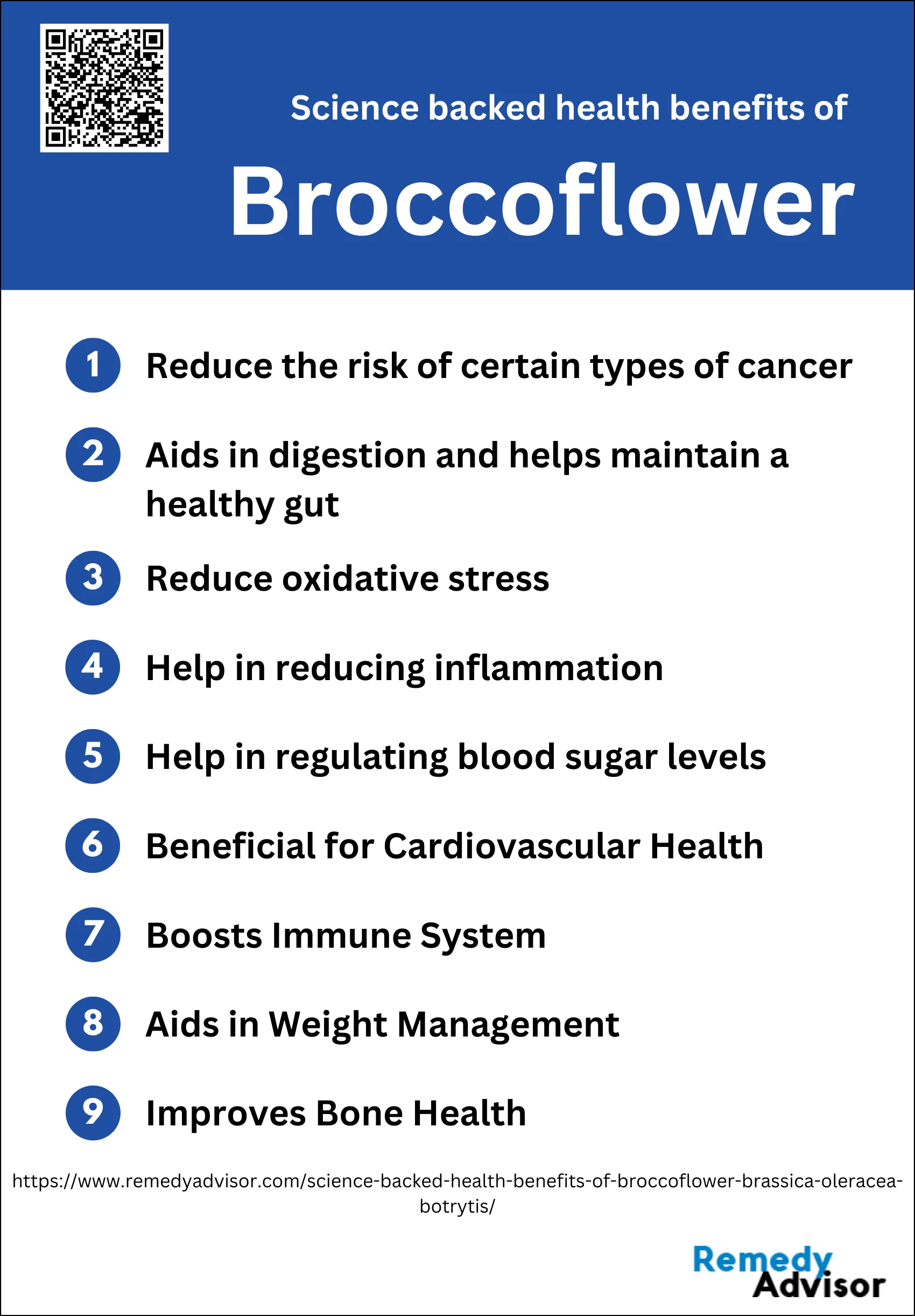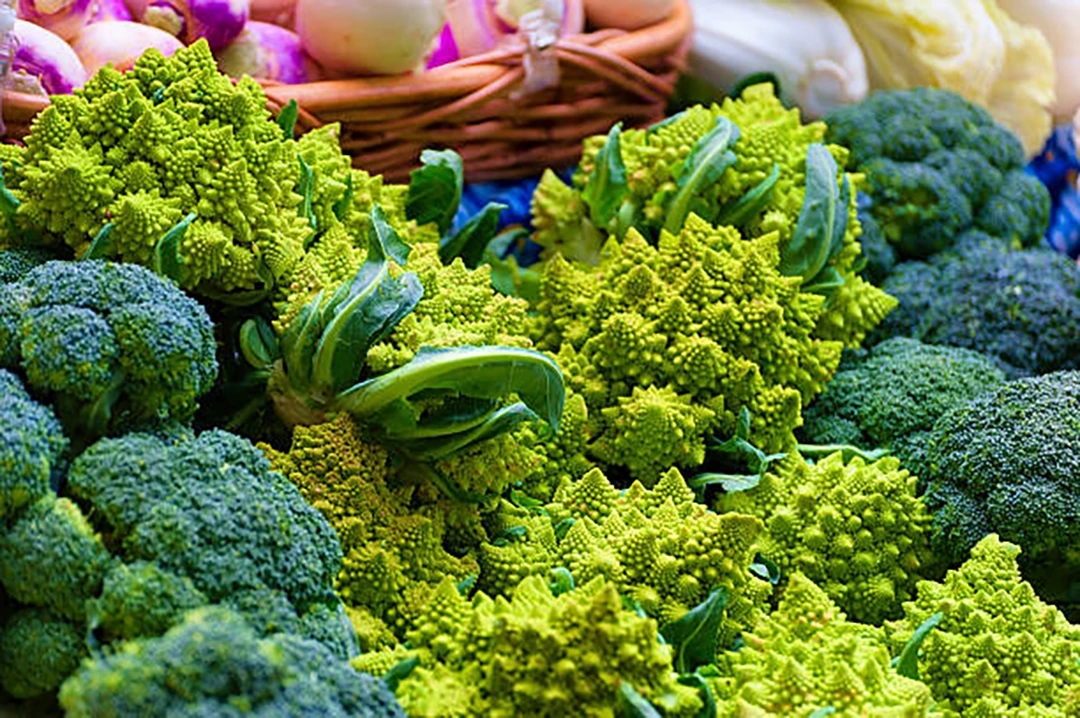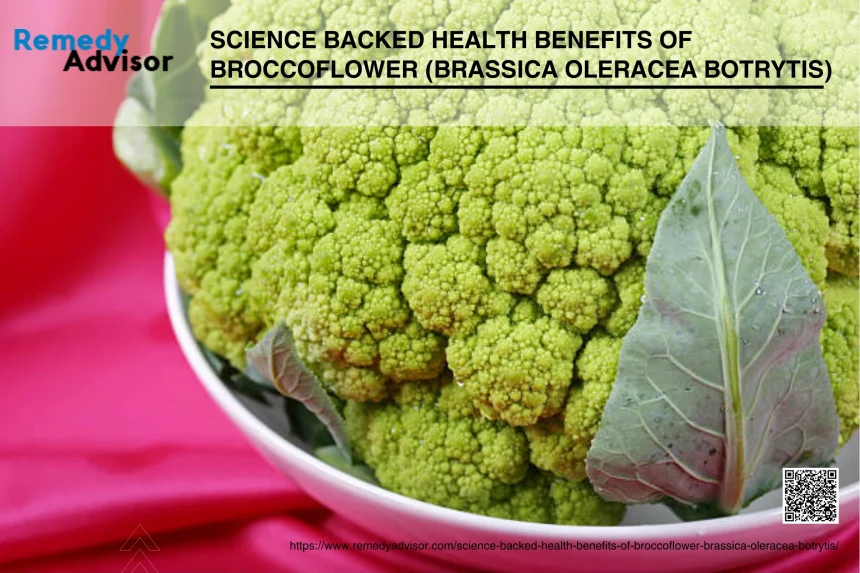Broccoflower, a unique hybrid of broccoli and cauliflower, is not just a visual delight with its vibrant green florets but also a powerhouse of nutrition. Scientifically known as Brassica oleracea Botrytis, this vegetable combines the best of both worlds, offering a sweeter flavor and a plethora of health benefits. Packed with essential vitamins like B, C, and folic acid, broccoflower supports various bodily functions, from boosting the immune system to enhancing digestive health. Its high fiber content aids in weight management, while antioxidants help combat oxidative stress and inflammation. Embracing broccoflower in your diet can be a delicious and nutritious way to harness the combined benefits of broccoli and cauliflower, making it a true superfood in the cruciferous vegetable family.
What is Broccoflower ?
Broccoflower is a hybrid vegetable that combines the characteristics of broccoli (Brassica oleracea var. italica) and cauliflower (Brassica oleracea var. botrytis). This unique vegetable exhibits the curd-like structure of cauliflower but with the green pigmentation of broccoli, resulting from the hypertrophy of the flower stalks and inflorescence meristems. Broccoflower is rich in bioactive compounds such as carotenoids, chlorophylls, and tocopherols, which contribute to its nutritional and health benefits, including antioxidant properties. The development and domestication of broccoflower involve complex genetic interactions, particularly the segregation of specific alleles at loci such as BoCAL and BoAP1, which influence the curd formation and inflorescence morphology. Additionally, environmental factors like temperature and irradiance significantly affect the vegetative growth and development of broccoflower, similar to its parent crops, broccoli and cauliflower. The breeding and cultivation of broccoflower aim to enhance its resistance to biotic and abiotic stresses while improving its organoleptic and nutraceutical traits.
Nutritional Content of Broccoflower
Broccoflower boasts an impressive nutritional profile that combines the best of both parent vegetables. This vibrant green cruciferous vegetable is low in calories, with only 31 calories per 100 grams of raw broccoflower. It’s an excellent source of essential nutrients, providing a balanced mix of carbohydrates, proteins, and a minimal amount of fat. Broccoflower contains approximately 6.09 grams of carbohydrates, 2.95 grams of protein, and a mere 0.3 grams of fat per 100-gram serving. This nutritional composition makes broccoflower an ideal choice for those seeking a nutrient-dense, low-calorie addition to their diet.
Macro and Micronutrients
Broccoflower is rich in both macronutrients and micronutrients, offering a well-rounded nutritional package. Its macronutrient profile includes a good balance of carbohydrates and proteins, with minimal fat content. The micronutrient content is particularly impressive, with broccoflower being an excellent source of vitamins and minerals. Notably, it provides a significant amount of vitamin C, with 147% of the daily value (DV) per serving. This high vitamin C content surpasses even that of oranges, making broccoflower a potent immune system booster. Additionally, broccoflower contains B-group vitamins, folic acid, and other essential micronutrients that contribute to overall health and wellbeing.
Breakdown of vitamins (A, C, K)
Broccoflower stands out for its exceptional vitamin content, particularly vitamins A, C, and K. Vitamin C is the most abundant, with broccoflower providing a remarkable 147% of the daily value per serving. This high vitamin C content not only supports immune function but also aids in collagen production and acts as a powerful antioxidant. Vitamin A is present in moderate amounts, offering 3% of the daily value. While not as high as its vitamin C content, the vitamin A in broccoflower contributes to eye health and immune function. Although specific data for vitamin K in broccoflower is not provided, it’s likely to contain significant amounts, given that both broccoli and cauliflower are known for their vitamin K content, which is crucial for blood clotting and bone health.
Essential minerals (calcium, iron, magnesium)
Broccoflower is a good source of essential minerals that play vital roles in various bodily functions. It contains calcium, providing 3% of the daily value per serving, which is important for bone health and muscle function. Iron is present in notable amounts, with broccoflower offering 4% of the daily value. This mineral is crucial for oxygen transport in the blood and overall energy metabolism. While specific data for magnesium in broccoflower is not provided, it’s likely to contain this important mineral, which is involved in numerous enzymatic reactions and contributes to muscle and nerve function. The combination of these minerals in broccoflower contributes to its overall nutritional value and health benefits.
Fiber content and its benefits
Broccoflower is an excellent source of dietary fiber, providing 13% of the daily value per serving. This high fiber content offers numerous health benefits. Fiber aids in digestion by promoting regular bowel movements and preventing constipation. It also helps in weight management by increasing satiety and reducing overall calorie intake. The fiber in broccoflower can contribute to better blood sugar control by slowing down the absorption of sugars, which is particularly beneficial for individuals with diabetes or those at risk of developing the condition. Additionally, the fiber content supports heart health by helping to lower cholesterol levels and reduce the risk of cardiovascular diseases.
Phytochemicals
Broccoflower, like its parent vegetables broccoli and cauliflower, is rich in phytochemicals – bioactive compounds that contribute to its health-promoting properties. While specific data on broccoflower’s phytochemical content is limited, it’s likely to contain similar compounds found in broccoli and cauliflower. These may include sulforaphane, indole-3-carbinol, and other isothiocyanates known for their potential anti-cancer properties. Phytochemicals in cruciferous vegetables like broccoflower have been associated with various health benefits, including reduced inflammation, improved cardiovascular health, and enhanced detoxification processes in the body.
Presence of glucosinolates and isothiocyanates
As a member of the Brassica family, broccoflower likely contains significant amounts of glucosinolates and isothiocyanates, although specific data for this hybrid is not provided. These compounds are characteristic of cruciferous vegetables and are known for their potential health benefits. Glucosinolates are sulfur-containing compounds that, when broken down during food preparation or digestion, form isothiocyanates. Isothiocyanates, particularly sulforaphane, have been extensively studied for their potential anti-cancer properties, ability to reduce inflammation, and support of the body’s natural detoxification processes. The presence of these compounds in broccoflower contributes to its status as a nutritionally valuable vegetable.
Antioxidant properties
Broccoflower possesses strong antioxidant properties, primarily due to its high vitamin C content and the presence of other phytochemicals. Antioxidants play a crucial role in protecting cells from oxidative stress caused by free radicals, which can lead to chronic diseases and premature aging. The vitamin C in broccoflower, providing 147% of the daily value per serving, acts as a powerful antioxidant. Additionally, broccoflower likely contains other antioxidants such as carotenoids and flavonoids, which are found in its parent vegetables. These antioxidants work synergistically to neutralize harmful free radicals, reduce inflammation, and support overall health. The antioxidant properties of broccoflower contribute to its potential in preventing various chronic diseases and promoting longevity.
Science backed health benefits of Broccoflower
Broccoflower is not only a visual treat with its vibrant green florets but also a nutritional powerhouse. This unique vegetable, scientifically known as Brassica oleracea Botrytis, combines the best attributes of its parent plants, offering a plethora of health benefits backed by science. From boosting immune function with its high vitamin C content to supporting bone health with essential minerals like calcium and magnesium, broccoflower is a versatile addition to any diet. In this article, we will explore the top science-backed health benefits of broccoflower, highlighting why this cruciferous vegetable deserves a spot on your plate.

1. Reduce the risk of certain types of cancer
Broccoflower may help reduce the risk of certain types of cancer due to its rich content of cancer-fighting compounds found in cruciferous vegetables. Like its parent plants, broccoflower contains glucosinolates, which are converted into bioactive isothiocyanates such as sulforaphane when the vegetable is chopped or chewed. These compounds have been shown to have potent anti-cancer properties, including the ability to inhibit tumor growth, induce cancer cell death, and modulate detoxification enzymes. Sulforaphane, in particular, has been extensively studied for its chemopreventive effects against various cancers, including prostate, breast, colon, and lung cancer. The high vitamin C content in broccoflower, surpassing that of oranges, also contributes to its antioxidant properties, which may help protect cells from DNA damage and reduce cancer risk.
What Research Says?
- Cruciferous vegetables, including broccoflower, are rich in glucosinolates, which are converted into isothiocyanates like sulforaphane. These compounds are potent inducers of phase 2 detoxification enzymes, which help protect against carcinogenesis.
- Broccoli sprouts, in particular, contain significantly higher levels of glucoraphanin (a glucosinolate) compared to mature plants, making them highly effective in reducing cancer risk.
- Study shows that eating brassica vegetables, like broccoli and cabbage, can lower the risk of getting cancers such as lung, stomach, colon, and rectal cancer.
- Broccoli and mixes like broccoflower have healthy stuff in them. These include diindolylmethane, selenium, and things called phenolic compounds. They are good for your health.
2. Aids in digestion and helps maintain a healthy gut

Broccoflower aids in digestion and helps maintain a healthy gut due to its high fiber content and beneficial phytochemicals. Like its parent vegetables, broccoli and cauliflower, broccoflower is rich in dietary fiber, which promotes regular bowel movements and prevents constipation by adding bulk to the stool. This fiber also serves as a prebiotic, nourishing the beneficial bacteria in the gut and helping to maintain a balanced microbiome. Additionally, broccoflower contains glucosinolates, which break down into bioactive compounds that support gut health by enhancing the intestinal barrier function and reducing inflammation.
What Research Says?
- Broccoli and cauliflower have healthy parts like glucosinolates, phenolic compounds, and vitamins. These can last through normal food cooking and digestion, but how well they last can change.
- Broccoli and cauliflower are cruciferous veggies. They have antioxidants and fight changes in cells. This helps keep us healthy.
3. Reduce oxidative stress
Broccoflower possesses potent antioxidant properties that can help reduce oxidative stress in the body. Like its parent vegetables, broccoflower is rich in antioxidants such as vitamin C, carotenoids, and glucosinolates, which are converted into bioactive compounds like sulforaphane when consumed. These antioxidants work synergistically to neutralize harmful free radicals and protect cells from oxidative damage. Sulforaphane, in particular, has been shown to activate crucial antioxidant defense pathways and support mitochondrial function under oxidative stress conditions. Broccoflower, have demonstrated their ability to boost detoxifying enzymes and reduce oxidative stress, which may contribute to a lower risk of chronic diseases such as cancer and cardiovascular disorders. The high vitamin C content in broccoflower, surpassing that of oranges, further enhances its antioxidant capacity and ability to combat oxidative stress.
What Research Says?
- Broccoflower and similar veggies have lots of antioxidants. These help fight off harmful molecules and lower stress in the body.
- The more phenolic content in these veggies, the better they are at fighting oxidative stress. This shows that veggies with more phenolics have stronger antioxidant power.
- Extracts from Brassica oleracea, like broccoflower, can block enzymes. This helps lower oxidative stress and damage in tissues.
- Heating methods like blanching, boiling, and steaming change the antioxidants in broccoflower. Steaming keeps the most antioxidants. Boiling and blanching make you lose a lot of them.
4. Help in reducing inflammation
Like its parent vegetables, broccoflower is rich in bioactive compounds such as sulforaphane, isothiocyanates, and flavonoids, which have been shown to have significant anti-inflammatory effects. These compounds work synergistically to inhibit the production of pro-inflammatory molecules like cytokines and prostaglandins, while also modulating key inflammatory signaling pathways such as NF-κB and MAPKs. Sulforaphane, in particular, has been found to regulate the activity of immune cells involved in inflammation, including macrophages and lymphocytes, thereby reducing inflammatory markers. Additionally, broccoflower’s high vitamin C content (147% of the daily value per serving) contributes to its antioxidant properties, which further help combat oxidative stress and inflammation.
What Research Says?
- Broccoli sprout extract, full of sulforaphane, greatly cuts down on swelling signals and substances like cyclooxygenase 2, interleukin (IL)-1β, IL-6, nitric oxide synthase that can be induced (iNOS), and tumor necrosis factor-α (TNF-α) in cells treated with lipopolysaccharide (LPS).
- Broccoli seedlings, like sprouts and microgreens, have lots of healthy substances. These include glucosinolates, phenolic compounds, vitamins, and minerals. They can help your health in many ways, such as reducing inflammation.
5. Help in regulating blood sugar levels

Broccoflower likely contains sulforaphane, a compound shown to have anti-diabetic effects. In a 12-week study, sulforaphane from broccoli sprouts lowered fasting blood glucose levels in obese adults with type 2 diabetes by 10% compared to a control group. Broccoflower is also rich in fiber, which aids in slowing digestion and preventing rapid blood sugar spikes. Additionally, its high vitamin C content (147% of the daily value per serving) may contribute to improved insulin sensitivity. The vegetable’s low calorie and carbohydrate content, combined with its nutrient density, make it a suitable choice for individuals looking to manage their blood sugar levels.
What Research Says?
- The extract from Brassica oleracea sprouts greatly lowered blood sugar in diabetic rats. It worked as well as the common diabetes drug Glibenclamide.
- Broccoli extract helped protect the pancreas of diabetic rats. It reduced damage in their tissue. This suggests it can guard against harm caused by diabetes.
- Broccoflower lowered the high blood sugar peak, but it didn’t cut overall blood sugar as much as other plants did.
6. Beneficial for Cardiovascular Health
Broccoflower is beneficial for cardiovascular health due to its rich content of fiber, antioxidants, and bioactive compounds. Like its parent vegetables, broccoflower contains sulforaphane, a potent antioxidant known for its anti-inflammatory properties, which can help protect blood vessels from damage and reduce arterial inflammation. This protection is crucial in preventing the buildup of plaque that can lead to atherosclerosis, a major risk factor for heart attacks and strokes. Additionally, the high fiber content in broccoflower aids in lowering bad LDL cholesterol levels, further supporting heart health by promoting better blood lipid profiles. The presence of essential vitamins and minerals, such as vitamin C, vitamin K, and potassium, also contributes to maintaining healthy blood pressure and overall cardiovascular function.
What Research Says?
- Broccoli sprouts and their extracts help the heart during ischemia-reperfusion injury. They lower oxidative stress and signs of cell death.
- Sulforaphane, found in broccoli, boosts antioxidant proteins such as thioredoxin and heme oxygenase-1. This helps protect the heart.
- Eating broccoli sprouts often can lower high blood pressure. This shows they are good for your heart.
- Eating lots of cruciferous veggies, like broccoli, can lower your heart disease risk. They have special compounds that help your blood vessels and metabolism work better.
7. Boosts Immune System
Broccoflower is a powerful ally in boosting the immune system, thanks to its rich content of essential vitamins and antioxidants. This hybrid vegetable is particularly high in vitamin C, providing more than 50% of the recommended daily intake per serving, which is crucial for the proper functioning of the immune system and the reduction of fatigue. Additionally, broccoflower contains bioactive compounds such as glucosinolates and sulforaphane, which have been shown to enhance the body’s antioxidant defense pathways, thereby protecting immune cells from oxidative damage and improving their function.
What Research Says?
- Broccoli has a special type of sugar that helps boost the body’s natural defenses. This sugar is made up of different parts, including galacturonic acid, galactose, glucose, arabinose, and rhamnose. The part that really helps the immune system is called polygalacturonic acid.
- Big sugar molecules in broccoli can boost the immune systems of animals and humans. These sugars make the body create proteins like TNFα in mice and a special peptide in silkworms, showing they can really kick-start our defenses.
- Scientists have found a new protein in cauliflower that helps the body’s natural defenses. This protein boosts the process of phagocytosis and makes more H2O2 and NO. These changes help the body get rid of harmful substances.
8. Aids in Weight Management

With only 31 calories per 100 grams, broccoflower provides a nutrient-dense option that can be incorporated into various meals without significantly increasing caloric intake. The high fiber content, approximately 2.9 grams per 100 grams, promotes feelings of fullness and satiety, which can help reduce overall calorie consumption and prevent overeating. Additionally, fiber aids in digestion and helps maintain stable blood sugar levels, further supporting weight management efforts.
What Research Says?
- Giving broccoli extract to obese rats on a high-fat diet made them gain less weight. It also lowered the amount of fat behind their belly and shrunk their fat cells.
- Broccoli sprout powder and a combo of broccoli sprout and mustard seed powder stopped weight gain and lowered fat cell growth in obese mice.
- Broccoli microgreens juice helped obese mice lose weight, cut down fat tissue, and shrink fat cells when they ate a high-fat diet.
- Broccoli stalks and tops help with blood fats and insulin use. Stalks greatly lower blood sugar levels and the HOMA-IR index.
- Broccoli leftovers made into flour boosted the basic activity of antioxidant enzymes. These include superoxide dismutase and glutathione S-transferase in obese mice.
9. Improves Bone Health
Broccoflower (Brassica oleracea Botrytis), a hybrid of broccoli and cauliflower, offers significant benefits for bone health. Like its parent vegetables, broccoflower is rich in vitamin K, which plays a crucial role in bone metabolism and the prevention of osteoporosis. This vitamin is essential for proper calcium absorption and utilization in bone formation. Additionally, broccoflower contains a good amount of calcium, providing about 3% of the daily value per serving. The vegetable also offers other bone-supporting nutrients such as magnesium, zinc, and phosphorous. These minerals work synergistically to maintain bone density and strength. Furthermore, the high vitamin C content in broccoflower (147% of the daily value per serving) supports collagen production, which is vital for the organic component of bone structure.
What Research Says?
- Broccoli leftovers made into flour boosted the basic activity of antioxidant enzymes. These include superoxide dismutase and glutathione S-transferase in obese mice.
- Sulforaphane, found in broccoli, can fight swelling. It might cut down on pain and prevent damage to cartilage in osteoarthritis (OA).
Incorporating Broccoflower into Your Diet
Broccoflower (Brassica oleracea Botrytis) is a versatile and nutritious vegetable that can be easily incorporated into various dishes. Its mild, slightly sweet flavor makes it an excellent addition to both raw and cooked preparations. To include broccoflower in your diet, try using it as a crunchy addition to salads, as a low-carb alternative to rice or potatoes, or as a nutrient-packed side dish. You can also incorporate it into soups, stir-fries, or casseroles for added texture and nutritional value. Experimenting with broccoflower in place of broccoli or cauliflower in your favorite recipes is an easy way to introduce this unique vegetable into your meal rotation.
Culinary Uses
Broccoflower’s culinary versatility allows for a wide range of preparation methods and flavor combinations. Its mild taste and firm texture make it suitable for various cooking techniques, including steaming, roasting, sautéing, and grilling. The vegetable can be enjoyed raw as crudités with dips or sliced thinly in salads. When cooked, broccoflower pairs well with garlic, lemon, cheese, and various herbs and spices. It can be used as a substitute for both broccoli and cauliflower in most recipes, offering a unique twist to familiar dishes. The vegetable’s vibrant green color also adds visual appeal to plates, making it an attractive option for both everyday meals and special occasions.
Different ways to prepare and cook broccoflower
Broccoflower can be prepared and cooked in numerous ways, similar to its parent vegetables. For a simple preparation, steam or boil the florets until tender-crisp, then season with salt, pepper, and a drizzle of olive oil. Roasting is another popular method: toss florets with olive oil and seasonings, then roast at 220°C (425°F) for 20-25 minutes until golden and crispy. For a quick sauté, slice the florets thinly and stir-fry with garlic and your choice of seasonings. Broccoflower can also be grilled, either as whole slices or in a grill basket, for a smoky flavor. For raw preparations, try slicing it thinly for salads or using it as a crunchy base for dips. The vegetable’s versatility allows for creative cooking methods, such as pulsing it in a food processor to create a low-carb “rice” or using it as a pizza crust alternative.
Recipes and meal ideas
Broccoflower’s unique flavor and texture make it an excellent ingredient for various recipes and meal ideas. One delicious option is Crispy Curry Broccoflower Bites, where florets are coated in seasoned breadcrumbs and baked until golden. For a comforting dish, try a Creamy Broccoflower Soup, blending the cooked vegetable with stock, cream, and your favorite herbs. A Broccoflower Stir-Fry with garlic, ginger, and soy sauce makes for a quick and healthy weeknight meal. For a low-carb option, create a Broccoflower “Rice” Bowl by pulsing the florets in a food processor and sautéing them with vegetables and protein of choice. Roasted Broccoflower Steaks seasoned with herbs and served with a tahini drizzle offer a satisfying vegetarian main course. These versatile recipes showcase broccoflower’s adaptability in various cuisines and cooking styles.
Buying and Storing Tips
When buying broccoflower, look for firm, compact heads with vibrant green coloration and no signs of browning or yellowing. The florets should be tightly closed and free from blemishes or soft spots. Choose heads that feel heavy for their size, indicating freshness and high water content. If leaves are attached, they should appear crisp and green. Avoid heads with loose or separating florets, as this may indicate age or improper storage. When it comes to storing broccoflower, keep it unwashed in a plastic bag in the refrigerator’s crisper drawer. While you can use closed plastic bags, it’s best to leave them open or use perforated storage bags to allow for some air circulation. Properly stored, broccoflower can last up to 6 days in the refrigerator.
How to select fresh broccoflower

When selecting fresh broccoflower, look for heads that are firm, compact, and heavy for their size. The color should be a vibrant chartreuse green, without any signs of yellowing or browning. Check that the florets are tightly closed and free from blemishes or soft spots. If leaves are present, they should be crisp and green, not wilted or discolored. Avoid heads with loose or separating florets, as this may indicate age or improper storage. The stem should be firm and free from dark spots. When possible, choose organic broccoflower to ensure it’s free from pesticides. Remember that size doesn’t necessarily indicate quality – smaller heads can be just as flavorful and tender as larger ones. By selecting fresh, high-quality broccoflower, you’ll ensure the best flavor and nutritional value for your meals.
Best practices for storage to retain nutrients
To retain the maximum nutrients in broccoflower, proper storage is crucial. Store unwashed broccoflower in a plastic bag in the refrigerator’s crisper drawer, where it can last up to 6 days. While closed plastic bags can be used, it’s best to leave them partially open or use perforated storage bags to allow for some air circulation, which helps prevent moisture buildup and premature spoilage. Avoid washing the broccoflower before storage, as excess moisture can lead to mold growth. Instead, rinse it just before use. To maintain vitamin C content, which is sensitive to light and air, keep the vegetable in a dark, cool environment. If you need to store cut broccoflower, wrap it tightly in plastic wrap or place it in an airtight container to minimize air exposure. For long-term storage, blanch and freeze the florets, which can help preserve nutrients for several months.
Potential side effects of eating Broccoflower
Based on the available information, here are some potential side effects of eating broccoflower:
Gastrointestinal Distress
Like other cruciferous vegetables, broccoflower contains complex sugars called raffinose that can be difficult for the body to break down. When these sugars reach the large intestine, they are fermented by gut bacteria, potentially leading to gas, bloating, and digestive discomfort. People with sensitive digestive systems or conditions like irritable bowel syndrome may be more prone to experiencing these side effects when consuming broccoflower in large amounts.
Thyroid Function Interference
Broccoflower, being a cruciferous vegetable, contains goitrogens – substances that can interfere with thyroid function by inhibiting iodine uptake. While this is generally not a concern for most people when consumed in moderation, individuals with existing thyroid conditions, particularly hypothyroidism, may need to be cautious about their intake. It’s important to note that cooking broccoflower can reduce its goitrogenic properties.
Allergic Reactions
Although rare, some individuals may experience allergic reactions to broccoflower. Symptoms can range from mild (such as itching or hives) to more severe (like difficulty breathing or swelling). Those with known allergies to other cruciferous vegetables like broccoli or cauliflower should be cautious when trying broccoflower for the first time and consult with a healthcare provider if they have concerns.
Medication Interactions
Broccoflower is rich in vitamin K, which plays a crucial role in blood clotting. For individuals taking blood-thinning medications like warfarin, consuming large amounts of vitamin K-rich foods like broccoflower can potentially interfere with the effectiveness of these medications. It’s important for people on blood thinners to maintain consistent vitamin K intake and consult with their healthcare provider about incorporating broccoflower into their diet.
Excessive Fiber Intake
While the high fiber content of broccoflower is generally beneficial for digestive health, consuming it in large quantities, especially if you’re not used to a high-fiber diet, can lead to digestive issues. These may include constipation, diarrhea, or abdominal discomfort. It’s advisable to increase fiber intake gradually and ensure adequate hydration when incorporating more broccoflower into your diet.
Conclusion
In conclusion, broccoflower is a nutritional powerhouse that offers a wide array of health benefits. This unique hybrid vegetable combines the best qualities of broccoli and cauliflower, providing a rich source of vitamins, minerals, fiber, and beneficial phytochemicals. From its potential to reduce cancer risk and aid in digestion to its ability to boost the immune system and support cardiovascular health, broccoflower proves to be a versatile and valuable addition to any diet. Its low calorie content and high nutrient density make it an excellent choice for weight management, while its antioxidant properties help combat oxidative stress and inflammation. By incorporating broccoflower into your meals through various cooking methods and recipes, you can enjoy its mild, slightly sweet flavor while reaping its numerous health benefits. As with any food, it’s important to be aware of potential side effects and consume it in moderation, especially for those with specific health conditions or on certain medications. Overall, broccoflower stands out as a nutritious and delicious vegetable that can significantly contribute to a balanced and healthy diet.
ADDITIONAL RESOURCES
Here is a list of US organizations related to research on vegetables, along with their short descriptions and URLs:
1. American Society for Horticultural Science (ASHS)
ASHS promotes and encourages scientific research and education in horticulture in all its branches. They are involved in research related to vegetables and other horticultural crops.
The Organic Center is a research and education organization focused on the benefits of organic farming. They conduct research on organic vegetable production and its impact on health and the environment.
The Rodale Institute is dedicated to pioneering organic farming through research and outreach. They conduct research on organic vegetable farming methods to promote sustainability and health.
Recommendations for books on Broccoflower
Here are some recommended books on the research of Broccoflower, along with links where you can find more information or purchase them:
1. “The Vegetable Gardener’s Bible, 2nd Edition” by Edward C. Smith
This book offers comprehensive information on growing various vegetables, including Broccoflower. It provides insights into plant care, soil management, and organic practices.
2. “Brassicas: Cooking the World’s Healthiest Vegetables” by Laura B. Russell
While primarily a cookbook, this book delves into the nutritional benefits and different varieties of Brassicas, including Broccoflower. It includes recipes and cultivation tips.
3. “Growing Hybrid Vegetables: Cultivating Crops and Plants for a Successful and Sustainable Future” by Marian S. Swarts
This book explores hybrid vegetables, including Broccoflower. It covers cultivation techniques, benefits, and challenges associated with hybrid crops.
4. “The Complete Book of Vegetables, Herbs & Fruit” by Matthew Biggs, Jekka McVicar, and Bob Flowerdew
This comprehensive guide covers a wide range of vegetables, including Broccoflower. It includes cultivation advice, varieties, and uses for different vegetables.
5. “Broccoli and Cauliflower: Growing, Harvesting, Storing, and Preserving Broccoli and Cauliflower” by Jason Johns
Although focused primarily on broccoli and cauliflower, this book includes relevant information on Broccoflower cultivation, care, and harvesting techniques.
FAQS
- What is Broccoflower?
Broccoflower is a hybrid vegetable that combines the characteristics of broccoli and cauliflower. It has a lime-green color and a flavor that is milder and slightly sweeter than either of its parent vegetables.
- What are the nutritional components of Broccoflower?
Broccoflower is rich in several essential nutrients. A 100g serving provides approximately 31 calories, 2.95g of protein, 13% of the daily value (DV) for dietary fiber, 147% DV for vitamin C, and notable amounts of B vitamins, vitamin A, calcium, and iron.
- How does Broccoflower support immune health?
Broccoflower is an excellent source of vitamin C, which is crucial for boosting the immune system. Vitamin C acts as an antioxidant, helping to protect cells from damage by free radicals and supporting overall immune function.
- Can Broccoflower help in cancer prevention?
Yes, like other cruciferous vegetables, Broccoflower contains glucosinolates, which have been shown to have cancer-preventive properties. These compounds help in detoxifying carcinogens and protecting cells from DNA damage.
- Is Broccoflower beneficial for heart health?
Broccoflower can support heart health due to its high fiber content, which helps reduce cholesterol levels. Additionally, its antioxidants and anti-inflammatory properties contribute to maintaining healthy blood vessels and regulating blood pressure.
- How does Broccoflower aid in digestion?
The high fiber content in Broccoflower promotes healthy digestion by aiding bowel movements, preventing constipation, and maintaining a healthy gut microbiome.
- Can Broccoflower improve bone health?
Yes, Broccoflower contains calcium and vitamin K, both of which are essential for maintaining strong bones and preventing osteoporosis. Vitamin K is particularly important for bone mineralization and blood clotting.
- Does Broccoflower have benefits for skin health?
Broccoflower’s high vitamin C content supports collagen production, which is vital for skin elasticity and repair. Its antioxidants also help protect the skin from damage caused by environmental factors.
- What role does Broccoflower play in weight management?
Broccoflower is low in calories and high in fiber, making it a great addition to a weight management diet. The fiber content helps you feel full longer, reducing overall calorie intake.
- How can Broccoflower be incorporated into a diet?
Broccoflower can be used in various culinary applications. It can be steamed, roasted, stir-fried, or eaten raw in salads. Its mild flavor makes it a versatile ingredient that can substitute for broccoli or cauliflower in most recipes.







